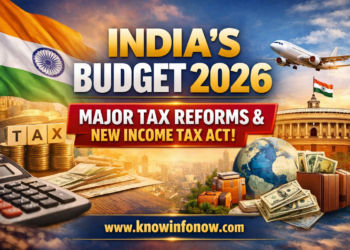Overview of the Income Tax Bill 2025
The Income Tax Bill 2025 represents a significant milestone in the ongoing evolution of tax regulation within the economic landscape. This comprehensive legislative proposal is drafted with the primary purpose of reforming and updating existing tax policies, taking into consideration the complexities of the modern economic environment. By addressing taxation in a systematic manner, the bill seeks to enhance compliance, streamline revenue generation, and foster a fair tax environment for all stakeholders.
Historically, income tax regulations have undergone numerous revisions to keep pace with changing economic conditions and societal needs. The Income Tax Bill 2025 emerges from the recognition that the previous framework was insufficient to address pressing challenges such as tax evasion, compliance burden, and the need for greater transparency. As economies grow more interconnected and dynamic, the bill aims to mitigate these issues while promoting a robust tax framework that encourages voluntary compliance and reduces administrative burdens on taxpayers.
Moreover, this bill is significant not only for its immediate impact on revenue collection but also for its long-term implications on economic growth. By fostering an efficient tax system, the Income Tax Bill 2025 is poised to stimulate business activities and investments, thereby contributing to overall economic stability. The need for reforms in taxation stems from the increased demand for public services and infrastructural development, necessitating a more equitable distribution of the tax burden. Furthermore, it includes provisions designed to modernize the tax collection process, harnessing technology to improve accuracy and efficiency.
In summary, the Income Tax Bill 2025 is not merely a set of new regulations; it is a proactive response to an evolving economic reality, aiming to balance revenue generation with equitable treatment of all taxpayers within the economy. Its passage is expected to usher in a new era of fiscal responsibility and economic resilience.
Major Changes in Tax Rates and Deductions
The Income Tax Bill 2025 introduces several significant adjustments to tax rates and deductions that are poised to impact taxpayers across various income brackets. One of the most prominent changes is the revision of personal income tax rates. The government has proposed a progressive tax rate structure, which aims to lower the tax burden on middle-income earners while slightly increasing rates for the highest income brackets. This shift emphasizes a more equitable distribution of tax responsibilities, ultimately fostering economic balance.
In addition to rate changes, the Bill also introduces adjustments in corporate tax rates. A reduction in the corporate tax rate from 25% to 22% for small and medium-sized enterprises (SMEs) is designed to stimulate growth and encourage reinvestment. Conversely, larger corporations may experience a slight increase in tax rates, which reflects the government’s intentions to generate additional revenue from businesses that can afford to contribute more significantly to the national treasury.
Tax deductions have also undergone substantial changes under the 2025 Bill. Notably, the introduction of new tax deductions for expenses related to renewable energy investments aligns with global efforts to combat climate change. Taxpayers can now deduct a specified percentage of their expenditures on renewable energy projects, thereby supporting environmentally sustainable practices while simultaneously providing financial relief through tax savings.
Furthermore, the Bill proposes the removal of several outdated deductions, such as those related to luxury expenses. This change aims to redirect taxpayer focus towards more productive investments and contributions to the economy. Households and businesses alike should carefully evaluate the implications of these adjustments, as they may have a substantial impact on disposable income and overall financial planning moving forward. The entirety of these changes indicates a responsive approach to the evolving economic landscape and the need for a more effective tax system that benefits all stakeholders.
New Compliance Measures and Enforcement
The Income Tax Bill 2025 introduces significant compliance measures aimed at bolstering tax compliance and enforcement mechanisms. These changes are designed to create a more efficient tax system that minimizes tax evasion while enhancing the overall integrity of revenue collection. A key feature of the bill is the implementation of stricter requirements for taxpayers when filing their income taxes. This includes mandatory digital submission of tax returns, which is expected to streamline the reporting process and reduce the incidence of errors or omissions that have historically plagued paper-based systems.
In addition to electronic filing, the bill mandates that taxpayers include comprehensive documentation substantiating their reported incomes and deductions. This may involve the disclosure of additional information regarding investments and financial transactions. The intent behind these new requirements is to enable tax authorities to conduct thorough audits and assessments, thereby ensuring compliance with tax regulations.
The bill also outlines enhanced penalties for non-compliance with the new measures. Taxpayers who fail to adhere to the stipulated filing requirements or who provide inaccurate information may face significant financial repercussions, including increased fines and possible legal action. These penalties serve a dual purpose: deterring willful non-compliance and encouraging adherence to tax laws among the broader taxpayer population.
Moreover, the bill includes provisions for increased monitoring and surveillance of tax submissions. By utilizing advanced data analytics and information-sharing arrangements between different government agencies, the government aims to identify patterns indicative of tax evasion. This proactive approach to enforcement is expected to reduce instances of tax evasion significantly, ultimately leading to increased tax revenue that can be redirected toward essential public services.
Through these new compliance measures, the Income Tax Bill 2025 is poised to transform the landscape of tax enforcement, fostering a culture of compliance while fortifying the mechanisms that uphold tax law integrity.
Potential Economic Impacts and Reactions
The Income Tax Bill 2025 is anticipated to have significant implications for various sectors of the economy, influencing growth patterns, consumer behavior, and overall investment climate. Economic experts have shared their insights on the proposed changes, highlighting both potential benefits and drawbacks. Many economists believe that the reduction in tax rates for lower and middle-income households could stimulate consumer spending. As disposable income increases, households are likely to increase their consumption, leading to a boost in demand for goods and services. This uptick in consumer activity can catalyze business expansion, potentially fostering job creation and economic resilience.
Conversely, some analysts caution that while the immediate effects may seem beneficial, the long-term consequences could be more complex. The reduced tax revenue could strain government budgets, affecting public services and infrastructure investments, which are crucial for sustained economic growth. A balanced assessment indicates that the fiscal responsibility surrounding the bill’s implementation will play a significant role in its effectiveness.
Business leaders and tax professionals have also expressed varied reactions to the bill. On one hand, many in the corporate sector anticipate that lower corporate tax rates may incentivize investment in innovation and expansion. This could lead to enhancing the competitiveness of businesses domestically and abroad. On the other hand, concerns arise regarding the bill’s equity; stakeholders argue that high-income earners might benefit disproportionately, widening the wealth gap.
Public reactions are equally divided, with some groups cheering for potential tax relief, while others criticize the lack of support for social programs. Advocacy groups have voiced their apprehension, asserting that the bill may jeopardize essential services relied upon by lower-income populations. As the discourse continues, it remains vital for stakeholders to consider the bill’s multifaceted impact, ensuring a balanced approach to tax reform that accommodates economic growth while safeguarding community interests.




















